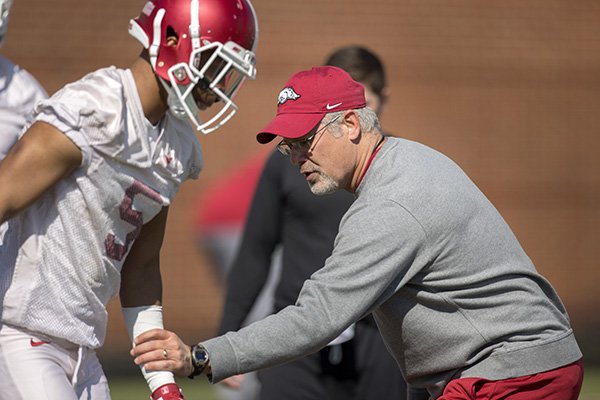FAYETTEVILLE — Paul Rhoads knows as well as any coach how talent, or lack thereof, can affect a football program.
The lack of talent was Rhoads' biggest problem as the head coach at Iowa State. In seven seasons leading the Cyclones, Rhoads went 26-48.
In his first year, he guided ISU to a 7-5 finish, just the program’s eighth winning season in three decades. After winning fans over with his fiery postgame speeches and an 18-20 record with three bowl appearances the first four years, the wheels fell off the next three years with just eight wins.
Painfully, ISU athletics director Jamie Pollard had to let Rhoads go. No one associated with the athletics department - Pollard included - wanted to see Rhoads dismissed. His positive attitude was infectious.
But college football is a business and Rhoads encountered the same problem that plagued Dan McCarney at the end of his tenure and Jim Walden and Jim Criner for their entire dismal careesr in Ames, Iowa. They simply couldn’t recruit the caliber of players needed to compete with the likes of Nebraska (now in the Big Ten), Oklahoma, Kansas State, Texas, Oklahoma State and others.
Rhoads finds himself needing to upgrade talent again, but this time it should be less difficult than at Iowa State. Still, it won’t be easy.
On Wednesday, Rhoads was officially elevated as Arkansas’ defensive coordinator after serving one season as a secondary coach. Rhoads, who has served nine seasons as a defensive coordinator at Pittsburgh and Auburn, helped the Hogs make great strides in pass defense, and only gave up 12 passing touchdowns.
Still, the unit as a whole was worse this year. Arkansas was 77th in yards per game (426.6) and 85th in scoring defense (31.1 points per game). The pass defense improved, in part, because teams ran so well against Arkansas, which gave up an FBS-leading 39 rushing touchdowns.
After blowing big leads to Missouri in the finale and Virginia Tech in the Belk Bowl, former UA defensive coordinator Robb Smith saw the writing on the wall. He was a candidate for the Wake Forest defensive coordinator gig before joining friend P.J. Fleck at Minnesota.
That saved Arkansas coach Bret Bielema from having to fire Smith, a longtime acquaintance. It is inconceivable how Smith could be retained if he hadn’t moved on. The regression of the defense couldn’t come without some cost.
However, the lackluster defensive performance the past two seasons can’t be totally blamed on Smith’s play-calling or personnel groupings. The talent level has dropped like a rock since Bielema got here. Smith had a great debut season because he had three NFL players on that unit including linemen Trey Flowers and Darius Philon, and linebacker Martrell Spaight.
That trio made a glut of big plays in 2014 and as a result the Hogs were able to beat LSU and Ole Miss by a combined 47-0 and cruise by Texas 31-7 in the Texas Bowl. Arkansas finished the year 10th nationally in total defense.
I thought Smith would plug in a new set of players and continue to dominate. I was wrong, and in 2016 with a veteran crew it was even worse. Smith didn’t suddenly forget how to coach. He didn’t have the same amount of talent. Arkansas has been slower and not as physical the past two years.
Bielema thinks moving to a 3-4 defense is the answer, but that could create another problem. That defense requires even more speed and athleticism. The staff must feel they have a better shot at recruiting those kinds of players, but if they could find more Flowers, Philons and Spaights they wouldn’t need to worry about that.
Arkansas hit a home run with freshman McTelvin Agim but has missed on other defensive recruits. There is a small margin for error there, and the Hogs' staff has to make sure if a player isn’t ready immediately he can be developed quickly.
That is one advantage Rhoads may have over Smith. Dating to his Iowa State days he has been able to polish players. He will probably have to do that again with his defensive personnel if they can’t find a way to add more four- and five-star recruits.
Rhoads is qualified for the job and he deserves to have the chance to show what he can do when he is the defensive CEO. His presence as a figure head could also help the entire team since he may have more of an opportunity influence more players with his positivity and fire.
However, Rhoads will not lead this unit to success if there isn’t more talent added. His biggest obstacles will come on the recruiting trail. But that is nothing new to him.

